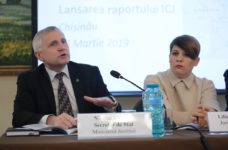The International Commission of Jurists (ICJ) said today that Moldova remained a significant way from having a functionally independent judiciary, which is an indispensable element in the country’s capacity to deliver justice for its people and institutions.
The ICJ’s report launched today ”Only an empty shell”-The undelivered promise of an independent judiciary in Moldova”, sets out a number of specific recommendations for reform which with a view to achieving a fully independent judiciary and effective justice system.
The report followed its field mission to Moldova in November 2018, which built upon the work of previous missions undertaken in 2004 and in 2012.
“While many significant legislative reforms have been undertaken, judicial independence is far from being achieved in Moldova”, said Massimo Frigo, Senior Legal Adviser for the ICJ Europe and Central Asia Programme, “Reforms are needed in the law, but more than that a change is needed the mindset and working culture of many judges themselves that must protect and promote judicial independence in all of their work”.
The ICJ acknowledged that important progress had been achieved in many areas, including in efforts to secure audio-recordings of all court hearings, the introduction of a system of random allocation of cases, and staff and salary increases for all judges.
However, the ICJ has concluded that the implementation of the most crucial legal reforms is significantly lagging behind and often lacks political will and conviction.
A culture of excessive hierarchy in the judiciary and of the judge remained prevalent among judges.
The ICJ is concerned at reports that the Superior Council of Magistracy (SCM) – a judicial self-governance body – instead of playing its crucial role of defending the independence of the judiciary, institutionally and in respect of individual judges, has become an instrument of pressure on individual judges and a threat to their independence.
“During our mission, we were presented with witness statements and stories of judges living often in a condition of fear: fear to express their opinions on the situation of the judiciary; and fear of criminal prosecution solely for issuing a decision contrary to the requests of the prosecutor’s office or of other powerful interests”, said Massimo Frigo.
Achieving judicial independence requires a change of attitude towards the judiciary from the executive and other sources of State and private power, but most importantly from the judiciary itself.
Recommendations
The ICJ report makes specific recommendations, including:
- The bodies of governance of the judiciary and any institution in the Republic of Moldova, within the limits of their competence, should do their utmost to strongly and publicly encourage all judges not to fear pursuing their professional responsibilities independently within the boundaries of the rule of law. Transparency, pluralism and free, respectful and competent, even if critical, opinion should be the cornerstone of the judiciary in Moldova;
- The composition of the SCM should be changed by removing the ex-officio membership of the Minister of Justice, Prosecutor General and the President of the Supreme Court of Justice. The number of judges from the first instance courts should be increased to ensure a greater level of representativeness;
- The initial temporary appointment of judges for a five-year term should be abolished;
- The judges of the Supreme Court of Justice should be appointed by the President, similar to the other judges, rather than by the Parliament;
- The SCM decisions on appointment and promotion of judges must be publicly motivated based on objective criteria;
- In order to ensure the transparency and accountability of the work of the SCM, its meetings should, as a rule, not be held behind closed doors, while the decisions of the SCM should include thorough reasoning in each case;
- The SCM should encourage and not impede judges from participation in external events, allowing them to speak freely about the challenges in the judiciary, and do not limit them from commenting and proposing constructive recommendations to strengthen the independence of the judiciary and its effectiveness;
- The Association of Judges should not be seen as a corporatist instrument, but as an umbrella institution acting openly and consistently for the defence of the independence of all judges. A pluralism of voices must be ensured in the judiciary, including by creating additional associations or groups to contribute to debate on strengthening the independence of the judiciary;
- Disciplinary proceedings should not be linked to evaluations assessments, as they should relate only to disciplinary offences provided by international standards;
- The criminal offence under article 307 from the Criminal Code (wilfully rendering a judgment, sentence, decision or ruling in breach of the law) constitutes a dangerous instrument of pressure on judges by the prosecution service and shall be abolished;
- Hearings in criminal cases must be held in public and the decisions must be clearly delivered in public. The use of closed court hearings including, and particularly, in high-level criminal cases that raise matters of public interest is contrary to international standards on transparency of judiciary and the fairness of proceedings;
- Investigative judges should enjoy full independence in practice;
- The provisions that excluded the obligation on district court judges to provide reasons for their decisions in civil matters should be abolished and the Moldovan authorities should identify alternative solutions to the deflation of the civil courts’ workload.
The full version of the report and full set of recommendations is available in English and Romanian.
This report was prepared by the International Commission of Jurists within the framework of the project “Promoting rule of law in Moldova through civil society oversight”, implemented by the Legal Resources Centre from Moldova (LRCM), which is made possible by the generous support of the American people through the United States Agency for International Development (USAID). The contents are the responsibility of the International Commission of Jurists and do not necessarily reflect the views of USAID, the United States Government or LRCM.
Romanian version of the report is available here.
English version of the report is available here.
You can watch the livestream of the launching event below:
Contacts:
Massimo FRIGO, Senior Legal Adviser, Europe and Central Asia Programme, International Commission of Jurists, [email protected]














